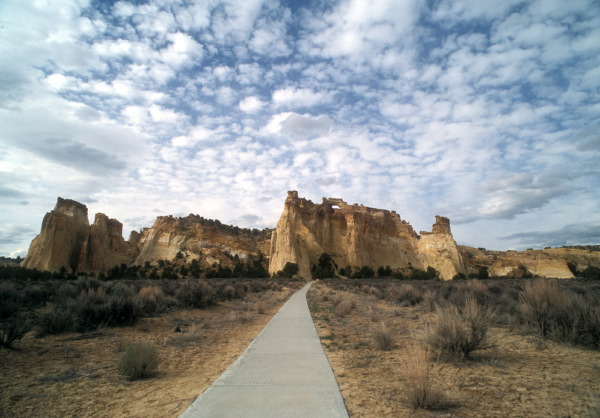Suburban Decline (or "The Death of Sidewalks")

- wadE
Wade's gambit
from yesterday got me thinking.
He says, "The neighbors haven't bowled us over with kindness yet. Actually, no one has stopped by at all.
In Richfield we had two plates of cookies and a freshly-snowblowed (snowblown?) driveway by now."
The demise of the "neighborhood" has been a question that I can't seem to find any answer to.
Growing up I knew the names of every person on my block, and most of houses didn't have kids. I knew because they
had lived there forever...when your a kid, forever is as long as you can remember; but many of the people on
my block had been there for more than 30 years by the time I was even born. These days, how long do people
live in the same house?
We live in a society that is transient. We switch jobs more often, we switch cities more often.
So do people make less effort to get to know their neighbors because who know how long they'll actually be there?
Why bother making an effort if they'll be gone tomorrow?
Maybe, but that's not the answer.
Perhaps it's because we're so busy. People spend more of their time on the commuting and working, especially
in suburbs. By the end of the day, who's got time to spend chewin' the fat with the neighbors? You've got to
walk the dog, play with the kid, feed the family, and watch your favorite shows...and before you know it, it's
time to go to bed.
Ah, so it's our busy lives and television that are to blame? Well, maybe, but I don't think that's the whole
answer.
I believe (and I've held this belief for years now) that it's the lack of sidewalks that have caused a decline
in the "neighborhood".
That may sound silly, but think about it. Suburbs have been developed on the assumption that every trip will
be made by car. There are no sidewalks. Neighborhoods are built on dead-ends. Yards are so big that there are
fewer houses on any given block, and they are set back far from the street. If you take a walk in a suburban neighborhood,
you're walking in the street, and in most suburbs you're a good 50 yards from the front of people's houses.
That isn't a very friendly environment for getting out and checking out the neighborhood. Nor is it conducive for
staring up conversations with neighbors...and that's assuming they are actually outside
to begin with, not cooped up in front of the TV.
There are many books out there that address this issue from either an environmental perspective, or an
ecnomic perspective, but no one has really focused on the social perspective. Sidewalks are only mentioned in passing.
-- You can't get to the local market, even if it's less than a mile away because
there is no sidewalk. -- And -- The consumption of gasoline from short trips is harming the environment. -- You'll
also see the sidewalk come up as a reason why people are overweight.
These are all valid and important points, but what about the effect it has on getting to know your neighbors? I
did find one woman's blog,
where she looks at it from a stay-at-home mom perspective.
What is the impact of the lack of sidewalks on a neighborhood? It removes most of the social supports for both
mothers and children. Know any teenaged baby sitters? I don't. Want someone to play with? Mom will make a few phone calls
and see what she can set up for Tuesday of next week. And it gets scary when there's an actual emergency if you don't
know anyone nearby. I've shovelled snow with pneumonia because I didn't know what else to do. I've taken an infant along
when I went to the emergency room, since there was nothing else I could do. Neighborhoods without sidewalks are stripped
of a lot of basic supports for family life because people do not know one another and do not regularly interact.
Are we going to end all wars and cure cancer if we put some sidewalks in? No, but it might make your neighborhood a
better place to live.
- 4/20/2002
Also check out this gambit
for some supplemental thoughts.

